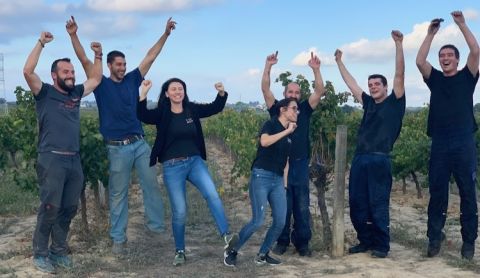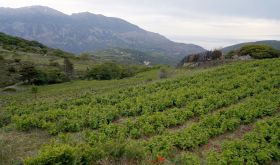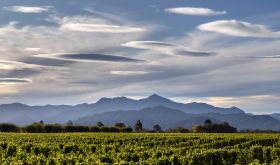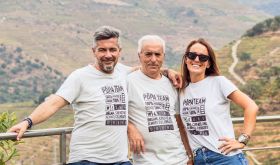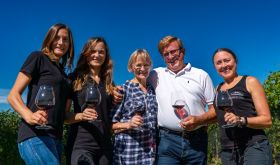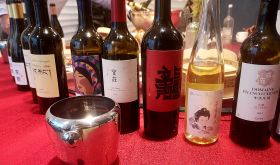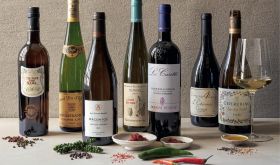From €11.10, $27, £23.49
Espígol is a new wine from this well-established family producer of still and sparkling wines in Pacs del Penedès, about 40 miles (65 km) west of Barcelona in the heart of Cava country.
Part of their R-Evolution range, Parés Baltà, Espígol 2018 was the first vintage and they planted a vineyard with Malvasía de Sitges just 10 years ago although vines were first planted on the estate that surrounds the winery in 1790. (See the history page of the Parés Baltà website for more.)
The winery has been managed since 2000 by Joan and Josep Cusiné Carol, grandsons of the company founder Joan Cusiné Hill, but it was the changes brought about by the women they married, winemakers Maria Elena Jiménez (originally a chemical engineer, above left) and Marta Casas (a pharmacist, above right), that inspired the R-Evolution range.
Marta Ràfols, who works with the family, tells the story of what happened when these two women started work at the winery – in 1999 and 2002 respectively – having retrained as oenologists at Tarragona university:
‘They started doing green harvesting in a very old Greache vineyard, called Hisenda Miret, which had previously been used to make a rosé wine. But they arrived and decided to make a red wine. When grandfather Joan saw what they were doing – throwing away healthy grapes – he went crazy. What are you doing, women!? But the result was so good that, since then, he never said anything against the women. When Marta and Maria Elena arrived at the winery, the family was just doing a few wines. They arrived and started innovating with methods of winemaking, blending … They made the revolution happen in the Parés Baltà winery.’
Malvasía de Sitges, officially called Malvasía Aromática in Spain, is better known under its Italian name of Malvasia di Lipari (and Malvasia di Sardegna). Marta Casas directed me to this exhaustive article about the variety and reported that, ‘According to INCAVI (the Catalan Institute of Vines and Wines), there are around 90 ha (220 acres) of Malvasía planted in 180 plots in Cataluña (2019), most of them in Penedès. The surface under vine has seen a sharp rise since 2010, when there were barely 10 ha in this appellation.’
I can see why. Produced from dry-farmed vineyards that are certified organic and biodynamic at 700 m (2,300 ft) in the foothills of the Serra d’Ancosta, this wine has a strong personality: intensely aromatic, as the variety’s official name suggests, with high acidity (the 2019 has 7 g/l and a pH of 3.3) giving terrific freshness – not always the case with markedly aromatic varieties other than perhaps Riesling. Espígol means ‘lavender’, a plant found in every garden in the region and a reference not to the wine's aroma but to its Mediterranean roots and local traditions. No synthetic products are used in the vineyards, which are fertilised after the harvest by their own flock of sheep.
In the 2019 vintage, the one that first caught my attention, the aromas are both floral and peachy, with a touch of orange, almost tropical but balanced by a more herbal and citrus quality. I found many different aromatic layers as the wine opened in the glass. Equally scented on the palate, a little more grapey, yet mouth-wateringly fresh, it unfurls to more tangy, spiced flavours. Although the fruit flavours are sweet, the wine is bone dry, with a long finish. The alcohol is a balanced 14% (13.5% on the label).
Fermented with organic yeast, the wine does not go through malolactic conversion and there’s no oak influence, but after fermentation in a stainless-steel tank, it spends five months on the lees in tank and in demijohns and this has given the wine depth and richness as a further counterpoint to the freshness. They have found that the demijohns really help to preserve the intensity and concentration of the aromas.
The 2018 was made in the same way and has similar intense and enticing aromas although the focus is more citrus than tropical and it seems even fresher, a little less full on the palate, the fruit not quite as sweet-tasting, therefore more elegant and not as rich. The biggest difference is in the alcohol levels: just 11.6% in the 2018 compared with 14% in the 2019, though the extra time in bottle for the former seems to have allowed it to fill out a little.
According to winemaker Marta Casas, the difference in ripeness levels, and thus in the alcohol, was a direct result of the weather:
'2019 was quite a typical vintage. In autumn 2018, we had a lot of rainfall (approx 250 mm/10 in)... It was precisely this precipitation which gave the vines adequate reserves for a good bud break in spring, helped by some 50 litres of precipitation in April. The climate was favourable to our work and vegetative growth; the plants had reserves from the rainfall of autumn 2018 and spring 2019, and the summer was very kind to us in terms of temperature, despite some heatwaves at the start of August, but with normal temperatures for that period during the rest of the summer.
'After three extremely dry years, for the 2018 vintage we had a year with plenty of water from the end of winter 2017 to the end of spring 2018. These pronounced rains kept regional temperatures from exceeding the average. This wet and cool start transitioned into a sweltering summer of cloudy skies that caused the ripening to have been relatively slow.'
Tasting the two vintages several months apart rather than side by side, I saw them as siblings rather than identical twins but I would be delighted to spend the evening with either of them.
Although Espígol is something of a rarity – just 1,277 bottles produced in 2018 and 3,456 in 2019 – the 2019 is available directly from the producer’s website for a remarkable price of €12, and they ship worldwide. It is also available in the US, with an RRP of $27, from VinVero Wines & Spirits, Bibber and Bell, and Chambers Street Wines (contact usa@paresbalta.com for more).
At the moment the 2018 is more widely available, as the Wine-Searcher results show, and it is this vintage that 9 Elms (the online retail arm of UK importer Top Selection) are offering at £23.49. It is also available from Casa España in Germany, Pascal Breton in France, and Far East wine shop in Shanghai (no website but the address is 1680 Huaihai Zhong Road, Xuhui; email michelleli410@aliyun.com).
With the 2020 harvest on the near horizon, I asked Marta Ràfols about the levels of coronavirus infection in Cataluña and how it was affecting their work. She pointed out that the biggest problem for the 2020 harvest is not coronavirus or lockdown but mildew in the vineyards. While they will be able to harvest healthy fruit, the vines themselves do not look pretty thanks to the effect on the foliage. However, she went on to give this much fuller insight into the affects of the pandemic in their region and in Cataluña and Spain more generally:
'The situation in Penedès is quite normal. The population here is low, the biggest town is 40,000 people, so less risk to get the virus. In my home town of Sant Sadurní, we are 10,000 and I don’t know of any case so far. As everywhere, young people are the problem ... some of them do not use a mask. Last week the government approved free coronavirus tests for all people from 20 to 45 years old living in Vilafranca del Penedès – the major city here in our area – to try to find the sources of infection.
'On the other hand, there are the big cities, such as Barcelona, Sabadell, Terrassa, Hospitalet (close to Barcelona). In Barcelona the government is also doing random tests in several places in the city to try to find the focus of infection. Sometimes I think they are doing well, but sometimes…
'The bigger problem is tourism. The cities are empty, the beaches are empty, the wine regions are empty. Catalan people, also Spanish people, try to travel close to their home town but, of course, restaurants, bars, hotels, wineries, shops and museums miss tourism. It is a very important sector, or the most important business sector, in Spain, and now you can stay in a 5-star hotel in Barcelona for €70. I have never seen this before.'
Even in this context, I hope the team are as happy after the 2020 harvest as they appear to be here at the end of the hard work of 2019.




